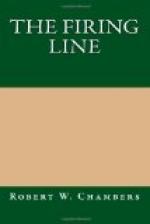Portlaw was exasperated. “There’s a girl there you behaved badly to. You’d better stay away.”
Malcourt looked innocently surprised.
“Now, who could that be! I have, it is true, at times, misbehaved, but I can’t ever remember behaving badly—”
Portlaw, too mad to speak, strode wrathfully away toward the stables.
Malcourt was interested to see that he could stride now without waddling.
“Marvellous, marvellous!—the power of love!” he mused sentimentally; “Porty is no longer rotund—only majestically portly. See where he hastens lightly to his Alida!
“Shepherd fair and maidens
all—
Too-ri-looral!
Too-ri-looral!”
And, very gracefully, he sketched a step or two in contra-dance to his own shadow on the grass.
“Shepherd fair and maidens
all—
Truly rural,
Too-ri-looral,
Man prefers his maidens plural;
One is none, he wants them
all!
Too-ri-looral!
Too-ri-looral—”
And he sauntered off humming gaily, making playful passes at the trees with his riding-crop as he passed.
Later he aided his wife to mount and stood looking after her as she rode away, Portlaw pounding along heavily beside her.
“All alone with the daisies,” he said, looking around him when they had disappeared.
Toward noon he ordered a horse, ate his luncheon in leisurely solitude, read yesterday’s papers while he smoked, then went out, mounted, and took the road to Pride’s Fall, letting his horse choose his own pace.
Moving along through the pretty forest road, he glanced casually right and left as he advanced, tapping his riding-boots in rhythm to the air he was humming in a careless undertone—something about a shepherd and the plural tastes of man.
His mood was inspired by that odd merriment which came from sheer perversity. When the depths and shallows of his contradictory character were disturbed a ripple of what passed for mirth covered all the surface; if there was any profundity to the man the ripple obscured it. No eye had ever penetrated the secrecy of what lay below; none ever would. Perhaps there was nothing there.
He journeyed on, his horse ambling or walking as it suited him, or sometimes veering to stretch a long glossy neck and nip at a bunch of leaves.
The cock-partridge stood on his drumming-log and defied the forest rider, all unseen; rabbit and squirrel sat bolt upright with palpitating flanks and moist bright eyes at gaze; overhead the slow hawks sailed, looking down at him as he rode.
Sometimes Malcourt whistled to himself, sometimes he sang in a variably agreeable voice, and now and then he quoted the poets, taking pleasure in the precision of his own diction.
“C’est le jour
des morts,
Mirliton, Mirlitaine!
Requiescant in pace!”
he chanted; and quoted more of the same bard with a grimace, adding, as he spurred his horse:




